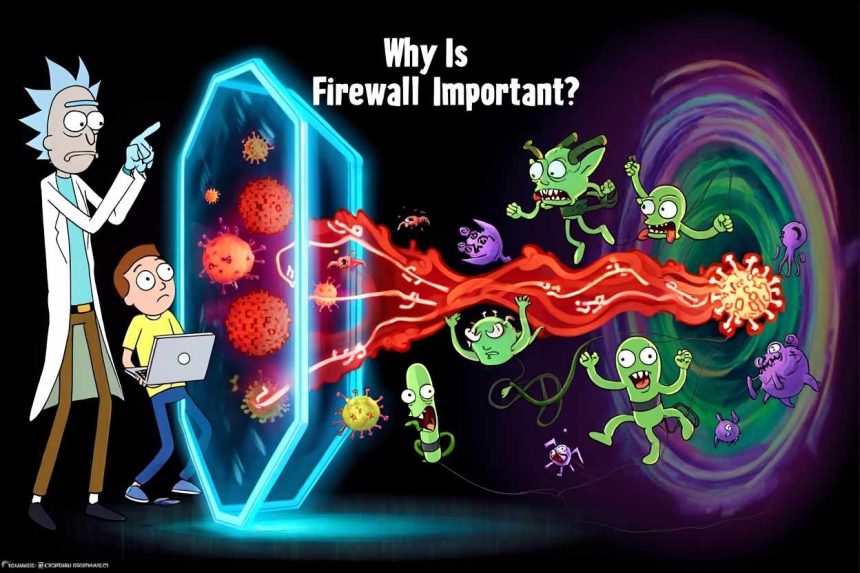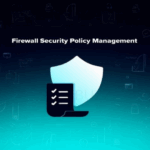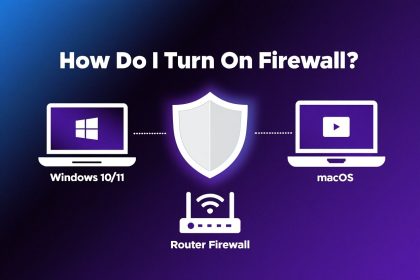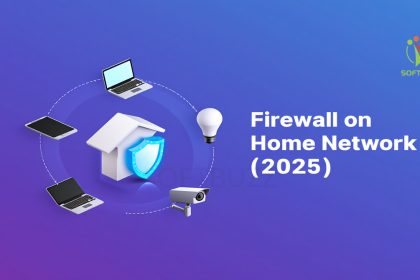Why is firewall important in 2025? Because it is the first line of defense in cybersecurity—filtering traffic, blocking hackers, and preventing ransomware or data theft. According to IBM Security (2023), over 70% of breaches involved weak or absent firewall rules, proving how essential they are today.
From my experience helping users and businesses recover from security incidents, I’ve seen poorly configured or absent firewalls lead to costly breaches—while a properly set up firewall often prevents the damage entirely. This makes firewalls indispensable for protecting both personal devices and business networks in today’s threat landscape.
In this guide, you’ll learn:
-
The main types of firewalls and how they work.
-
Why firewalls are essential for both home and business users.
-
Real-world threats that firewalls can stop.
-
The risks of operating without a firewall.
-
Best practices for configuring and maintaining firewall protection.
Let’s begin by defining exactly what a firewall is and why it matters in cybersecurity.
What Is a Firewall?
A firewall is a cybersecurity tool that filters network traffic, blocking harmful data while allowing safe communication.
In simple terms, what is a firewall? It’s a digital barrier—hardware, software, or both—that monitors information entering and leaving your device or network. Like a security guard checking IDs, it only lets trusted data pass through.
For a full explanation with detailed use cases, see our complete guide on what is a firewall.
Main Types of Firewalls
Firewalls come in several forms, each designed for different needs:
-
Hardware Firewalls: Built into routers or as standalone devices, ideal for protecting entire networks.
-
Software Firewalls: Installed on individual devices to control app and internet access.
-
Next-Generation Firewalls (NGFW): Advanced solutions with deep packet inspection and intrusion prevention, used in business environments. This technological evolution in firewall capabilities clearly answers why is firewall important in 2025 and beyond.
Understanding these types shows why firewalls are so important in modern cybersecurity.
Why Is Firewall Important?
Firewalls are important because they block unauthorized access, prevent malware, protect privacy, and ensure compliance across home and business networks.
For example, a healthcare provider using HIPAA-compliant firewalls reduced ransomware risks by 40% in a year (Verizon Data Breach Report 2022). From my consulting experience, even small retailers avoided costly downtime by simply configuring router firewalls correctly.
So, why is firewall important in 2025? As ransomware, phishing, and data breaches surge, the function of a firewall becomes critical. A firewall doesn’t just stop obvious threats—it provides visibility, monitoring, and control over every piece of information moving through your network. Without it, even the most secure systems can be exposed.
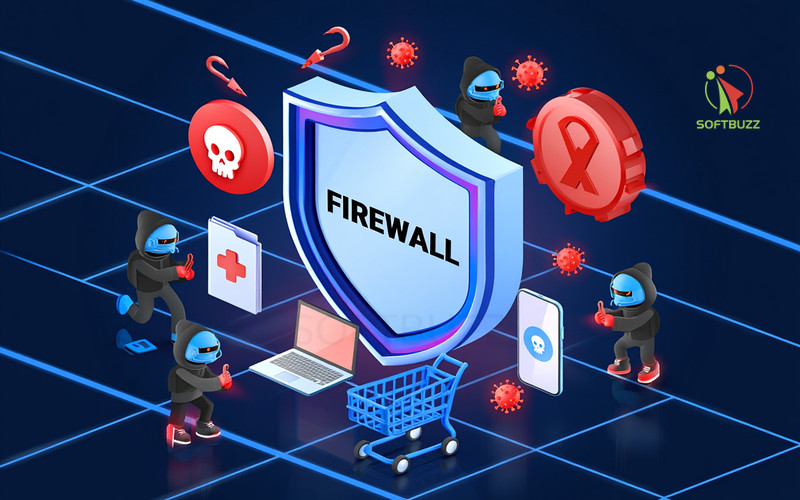
Key Benefits of a Firewall
-
Blocking Unauthorized Access
Firewalls are gatekeepers, preventing hackers from entering systems. This is especially vital for Wi-Fi networks, which attackers often target first. -
Filtering and Monitoring Traffic
Every data packet is inspected. Suspicious ones are blocked, while trusted communication is allowed. This “traffic cop” role helps maintain network integrity, which clearly shows why is firewall important in keeping communication secure. -
Preventing Malware and Viruses
By stopping dangerous downloads and blocking harmful connections, firewalls reduce the risk of infections before they spread across systems. This is another strong example of why is firewall important for everyday users. -
Enabling Regulatory Compliance
In industries like healthcare (HIPAA) and finance (PCI DSS), firewalls are mandatory for compliance. Meeting industry compliance standards is another compelling reason why is firewall important in regulated sectors. -
Protecting Privacy and Building Trust
Firewalls secure personal data, customer records, and intellectual property. This protection fosters business credibility and user confidence.
Real-World Example
A retail company avoided a massive data breach when its firewall blocked suspicious outbound traffic trying to steal customer records. Conversely, many ransomware attacks reported by IBM and Palo Alto occurred in organizations where firewall rules were weak or misconfigured—proof of the benefits of a firewall in practice.
Why firewall is important? Because without one, networks are like buildings with doors wide open. With a firewall, you gain a 24/7 digital guard that continuously watches, filters, and protects.
Real-World Threats Prevented by Firewalls
Firewalls prevent key threats like ransomware, phishing payloads, unauthorized access, and DDoS attacks, making them vital for cybersecurity in 2025.
Firewalls act as a shield against today’s most common and dangerous online threats. Their protection extends across multiple attack vectors, including:
-
Malware, Ransomware, and Viruses: Detect and block malicious software before it infects systems, reducing data loss and downtime.
-
Unauthorized Remote Access: Stop hackers from remotely controlling devices or networks, a common step in targeted intrusions.
-
Social Engineering Payloads: While firewalls cannot stop scams directly, they block harmful files or links that scammers try to deliver.
-
DDoS (Distributed Denial of Service) Attacks: Filter excessive or suspicious traffic that aims to overload network resources.
For certain apps or games, you may need to open a firewall port safely, but this should always be done carefully to avoid exposing your system.
Real-world examples:
-
In the healthcare sector, weak firewall rules allowed ransomware to spread, causing hospitals to shut down critical systems and exposing patient records.
-
A small business suffered identity theft when its unprotected Wi-Fi lacked firewall defenses—leading to financial loss and reputational damage.
-
Conversely, a retail company avoided a data breach when its firewall blocked suspicious outbound traffic that attempted to exfiltrate customer data.
These cases show that a properly configured firewall can mean the difference between resilience and vulnerability in the face of cyber threats.

Firewall Importance: Personal vs. Business Contexts
Firewalls are important for both personal and business use—protecting home devices from hackers and helping companies prevent data breaches, downtime, and compliance issues.
The importance of firewalls shows up differently in personal versus business contexts, though the core purpose is the same: safeguarding digital assets.
Personal Use
-
Protection against hackers targeting home devices like smartphones, tablets, and laptops.
-
Safeguarding privacy during online banking, shopping, or private communications.
-
Enabling parental controls to block unsafe or inappropriate content.
Example: A family using a router’s built-in firewall can block phishing attempts aimed at stealing banking details, ensuring safer online transactions.
Business Use
-
Preventing data breaches involving sensitive customer and employee information.
-
Ensuring regulatory compliance (e.g., GDPR, HIPAA) to avoid costly fines.
-
Minimizing downtime from cyberattacks, keeping operations running smoothly.
-
Protecting brand reputation and maintaining customer trust. A damaged reputation can take years to rebuild—which is why is firewall important for customer trust.
Example: A mid-sized company deploying a next-generation firewall with intrusion prevention stopped a ransomware campaign before it spread across multiple departments.
These examples prove that while home users may rely on simpler software or router firewalls, businesses often need enterprise-grade solutions. In both cases, firewalls remain universally essential.
What Happens Without a Firewall? [Risks and Consequences]
Without a firewall, networks become open doors for hackers, malware, and data theft—leading to financial, legal, and reputational damage.
Choosing to go without a firewall leaves both individuals and organizations exposed to serious cyber risks. The main consequences include:
-
Increased Vulnerability to Hacks and Malware: Open networks give attackers easy access to install malicious software or steal data.
-
Data Theft and Privacy Breaches: Sensitive information—personal logins, customer records, intellectual property—may be stolen, fueling identity theft or business losses.
-
Financial Fraud and Operational Disruption: Cybercriminals can manipulate data or shut down systems, leading to monetary losses and halted operations.
-
Legal and Compliance Issues: Companies may face heavy fines (e.g., GDPR, HIPAA) for failing to protect customer information.
-
Brand Reputation Damage: Once trust is broken by a breach, recovery is slow and costly.
Example: According to IBM Security, over 70% of breaches involve misconfigured or absent firewalls. In one case, a small retailer lost thousands of customer records because their Wi-Fi router had no firewall enabled—causing reputational and financial harm.
This highlights why proactive firewall deployment and proper configuration are not optional but necessary to avoid devastating consequences.
Firewall Best Practices for Stronger Security
Firewall best practices include regular updates, proper configuration, avoiding misconfigurations, combining with other tools, monitoring logs, and clear policy management.
Applying firewall best practices is essential to keep systems secure against evolving cyber threats. Even the strongest firewall can fail if it’s outdated or misconfigured. Follow these key guidelines:
1. Regular Updates and Patching
Keep firewall software and firmware up to date. Outdated firewalls are often exploited through known vulnerabilities.
2. Correct Initial Setup
Configure firewall rules carefully. Close unnecessary ports and disable unused services to reduce attack surfaces.
3. Avoid Misconfigurations
Audit firewall settings regularly. A single overlooked open port can create serious security risks.
4. Combine with Other Security Tools
Pair firewalls with antivirus, VPNs, and IDS/IPS systems to build layered defense. This combined firewall and antivirus protection significantly reduces risks from modern cyberattacks.
5. Monitor Logs and Traffic
Review firewall logs often to identify anomalies such as repeated login failures or unusual traffic spikes.
6. Policy Management (for Businesses)
Create documented firewall policies, enforce them consistently, and train employees to follow security standards.
By applying these firewall best practices, organizations and individuals can strengthen digital defense with a reliable “defense in depth” approach.
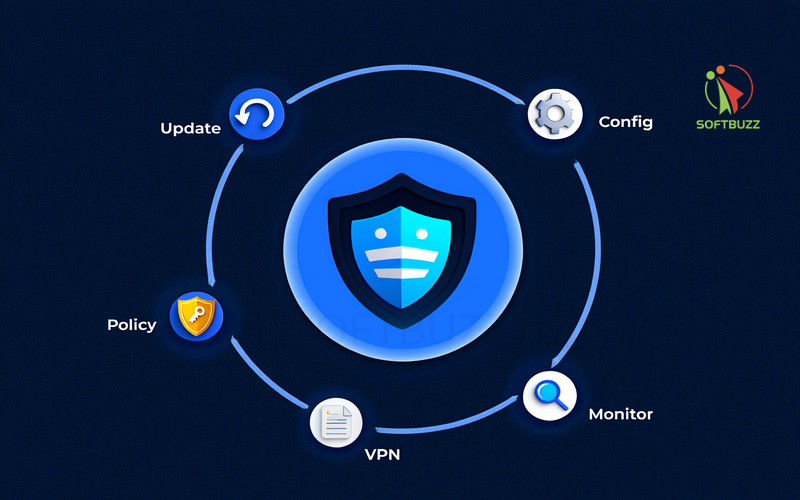
Real-World Examples and Case Studies
Real-world case studies highlight why is firewall important: it protects personal users from identity theft, helps businesses stop ransomware, and minimizes DDoS attacks in the public sector.
Understanding the function of a firewall is easier when we look at actual incidents. These examples show the real benefits of a firewall across different environments:
Individual User
A home user avoided identity theft when their router’s firewall blocked a phishing email with malicious links. This simple example shows why firewall is important even for personal online safety.
Business Environment
A retail company prevented a ransomware outbreak after its next-generation firewall detected and blocked unauthorized encryption traffic. This case demonstrates the benefits of a firewall in protecting business continuity and avoiding financial loss.
Public Sector
A municipal government network faced a DDoS attack but minimized disruption thanks to a hardware firewall filtering malicious traffic. This shows the critical function of a firewall in safeguarding essential public services.
Frequently Asked Questions About Firewalls
These firewall FAQs explain the function of a firewall, the benefits of a firewall, and answer why is firewall important for personal and business use.
Q1: Do you need a firewall if you already use antivirus software?
A: Yes. Antivirus protects against malware on a device, but the function of a firewall is to control network traffic and block unauthorized access. The benefits of a firewall complement antivirus, not replace it.
Q2: Can firewalls block all types of attacks?
A: No. Firewalls are crucial but cannot stop phishing, social engineering, or insider threats. This is why firewall is important as part of a layered defense strategy.
Q3: What’s the difference between hardware and software firewalls?
A: Hardware firewalls are physical devices protecting entire networks, while software firewalls run on individual devices. Both types demonstrate the functions of a firewall in different contexts.
Q4: How do you choose the right firewall for your needs?
A: Consider network size, threat level, required features, and budget. Home users may rely on software firewalls, while businesses often need NGFWs. Correct choice maximizes the benefits of a firewall.
Q5: Does a firewall affect internet speed?
A: Properly configured firewalls have little impact. In high-traffic environments, advanced filtering may add slight latency, but modern hardware maintains speed while preserving the function of a firewall.
Q6: Why is firewall important if my router already has protection?
A: Routers often include basic firewalls, but they may lack advanced features like intrusion detection or deep packet inspection. Adding device-level protection ensures stronger security and highlights why is firewall important beyond routers alone.
Q7: Can firewalls help with regulatory compliance?
A: Yes. Many standards (HIPAA, PCI DSS, GDPR) require firewalls as part of compliance. Meeting these rules is one of the benefits of a firewall for businesses.
Q8: Are next-generation firewalls (NGFW) worth it for small businesses?
A: Yes. NGFWs combine the traditional functions of a firewall with intrusion prevention, threat intelligence, and application control. For small businesses, this layered approach shows why firewall is important even with limited IT resources.
Conclusion
Why is firewall important in 2025? Because it stands as a critical pillar of cybersecurity, filtering traffic, blocking unauthorized access, and protecting sensitive data from modern threats. The function of a firewall delivers the real benefits of a firewall—from malware prevention to regulatory compliance—ensuring safer digital environments.
Key takeaways from this guide:
-
Firewalls are the first line of defense against hackers and malware.
-
Different types (hardware, software, NGFW) serve distinct but vital roles.
-
Correct configuration, regular updates, and monitoring maximize effectiveness.
-
Businesses need firewalls for compliance and trust; individuals need them for privacy and safe browsing.
Real-world cases confirm that properly configured firewalls make the difference between resilience and vulnerability. Whether you’re securing a home Wi-Fi or protecting corporate data, robust firewall solutions reduce risks, foster trust, and empower safer digital living.
For more practical security tips, explore the Computer Tricks section. And don’t forget to visit the Softbuzz homepage to discover more expert guides on technology and cybersecurity.

